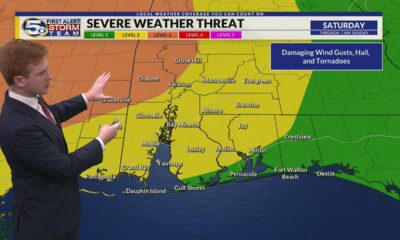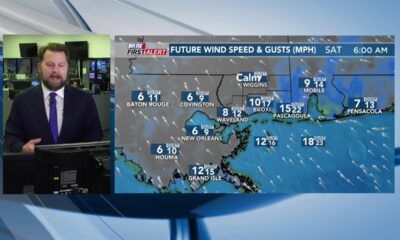Kaiser Health News
Even in the Most Depressed County in America, Stigma Around Mental Illness Persists
Phil Galewitz, KFF Health News
Wed, 06 Sep 2023 09:00:00 +0000
LOGAN, W.Va. — Sitting on a bench laughing with a co-worker during a morning smoke break, Debra Orcutt quickly raises her hand when asked if she knows anyone dealing with depression.
“I am,” she tells a visitor to the roadside market where she bakes brownies and peanut butter fudge.
Orcutt, 63, has used medication to manage her depression for more than two decades since her son, Kyle, died at age 4 from a congenital illness. “There were days I couldn’t leave the house,” she said.
After a long marriage that ended in divorce, she said, she lives happily with her “hillbilly” partner near this small town in the heart of Appalachia, an hour’s drive south of the state capital, Charleston. But certain things, such as the sound of an ambulance siren or the death of her potbellied pig, can trigger lingering feelings of sadness.
Orcutt is hardly alone in this county, where almost everyone knows someone with depression — or experiences it themselves. And that’s not an exaggeration.
An estimated 32% of adults in Logan County, West Virginia, have been diagnosed with depression — the highest rate in the United States and nearly double the national rate, according to a report released in June by the Centers for Disease Control and Prevention.
The study, which provided estimates by county based on a national survey of nearly 400,000 people conducted in 2020, showed depression rates varied widely by region and even within states. Most counties with the highest rates were in a 13-state swath of Appalachia; the southern Mississippi River Valley, particularly Arkansas, Louisiana, and Tennessee; and Missouri, Oklahoma, and Washington.
The states with the lowest rates included California, Illinois, Alaska, and Hawaii.
West Virginia, which also has some of the nation’s highest rates of poverty and poor health, is home to eight of the 10 counties with the highest estimated rates of adult depression, the CDC survey found.
Overall, 18% of adults in the United States reported having been diagnosed with depression in their lifetimes, the CDC survey found.
Health experts say depression has risen to epidemic levels in the U.S. in recent decades, and the covid-19 pandemic exacerbated the problem with its isolating public health measures, threat of serious illness, lingering health effects, and sobering death toll.
With heightened awareness of rising depression rates, the Biden administration has announced plans to expand access to mental health care.
The CDC findings correlate with those from other surveys that show depression rates at alarming levels.
More than a simple case of the blues, depression is a mood disorder that causes a persistent feeling of sadness and a loss of interest in things once enjoyed. It affects eating, sleeping, and concentrating, as well as activities such as working or going to school.
“Depression is often a chronic illness, and if you stop treatment, it eventually comes back,” said Mark Miller, a psychiatry professor at West Virginia University in Morgantown.
He said his state’s combination of poor overall health, low education levels, and poverty — as well as the opioid epidemic, which has hit West Virginia particularly hard — takes a punishing toll on residents’ mental health.
In Logan County, nearly a quarter of whose 31,000 residents live in poverty, few expressed surprise in interviews with KFF Health News when told their home tops the list of most depressed counties.
“You’ve come to the right place for depression,” said Marie Tomblin as she worked the front desk of the Holiday Inn Express & Suites in Logan, noting her sister, daughter, and other family members have faced it. “I see it a whole lot, and people think it’s a normal feeling and don’t want to admit they have a problem,” she said.
Logan County is in the Appalachian coal-mining region, now a shadow of its former self, as the industry has buckled under economic and regulatory pressures, taking many jobs with it. In Logan, the county seat, the downtown has numerous closed stores and office buildings, and few people were out walking its sidewalks on a recent weekday morning.
The county’s high rates of chronic diseases like diabetes and obesity also make it a breeding ground for depression, health experts say.
While depression rates have risen nationally, Medicare claims data shows treatment for depression has increased more in West Virginia and especially in Logan County in recent years. Nationwide, 18% of enrollees in original Medicare received care related to depression in 2020, up from 16% in 2012 — despite an overall drop in care as the pandemic struck.
In Logan County, it was 28% of Medicare enrollees in 2020, up from 21% in 2012. As in the CDC study, Logan County’s numbers were among the highest in the country.
Yet, health professionals here say they are not overwhelmed by people seeking help for the condition.
Robert Perez, an internist in Logan, estimates more than half of his patients have depression. But he said few want to talk about it or accept a referral to a psychiatrist and he is limited in what he can do for them.
“It’s hard to convince people who don’t want to be helped,” he said. “I don’t have that much time to treat their depression.”
David Brash, the chief executive of Logan Regional Medical Center, which sits on a hill overlooking the town, said he’s not surprised by the area’s high depression rates.
The medical center doesn’t have psychiatrists on staff, but its primary care doctors try to treat depression as part of their practice, he said. The center recently started offering telepsychiatric consultations for its physicians to help treat patients in its emergency room.
“When you come from this area, you know what the challenges are,” Brash said. “And the economic challenges affect the depression — it’s not a new phenomenon.”
Diana Barnette, the county’s top elected official as president of the Logan County Commission, said doctors are often too quick to give patients medicine when they are feeling down. “I’m not saying we do not have a lot of depression in the area, but culturally it’s become so accepted to have a doctor give you a pill to make you feel better.”
Barnette, who owns several businesses in the county, including a movie theater, also blames the region’s rainy, cloudy weather and how its mountains limit residents’ sun exposure.
“There’s still a lot of stigma around it,” said Michael Baker, a pharmacist at Aracoma Drug Company, a pharmacy in Chapmanville, the county’s largest town after Logan.
Indeed, Chris Palmer, an assistant professor of psychiatry at Harvard Medical School, said the notion that overprescribing or cloudy weather explains high depression rates does not help the problem.
That viewpoint “strikes me as a hopeless and nihilistic attitude, that we are drowning and there is nothing we can do about it,” he said.
There are glimmers of hope here.
The pandemic is considered over by most residents; the state has leaned into its tourism motto, “Almost Heaven,” inspired by a well-known John Denver tune; and the region’s economy is slowly shifting from coal as the county markets its wooded trails to all-terrain vehicle enthusiasts.
In June, the same month the CDC released its findings, Coalfield Health Center, a federally funded clinic in the county, announced it had hired its first psychiatrist, David Lewis.
Lewis, who grew up in Logan County and taught high school math here, said he has seen about 50 patients so far and knows he has room to see more.
“People are not used to having the option of going to a psychiatrist here, and doctors still refer out to bigger institutions, which could be in Charleston,” he said.
Coalfield is struggling to overcome the stigma and other treatment obstacles around depression. In this region, Lewis said, people often view going for mental health help as being “weak in faith.”
“Only a small percentage of people who need help for depression are getting it,” said Kristin Dial, the executive director of Coalfield Health Center. “What we have found is that we can refer them to Dr. Lewis, but we have a high no-show rate.”
“We have to be here when they are ready,” she said.
Lewis said the best treatment for depression includes improving diet and exercise and avoiding drugs and alcohol. But when patients are asked how they want to manage their illness, they tend just to want pills, he said.
Coalfield also has a nurse practitioner, Elice Hinkle, who recently finished training to offer counseling at the clinic.
Because patients know Hinkle from her having treated their physical ailments, she said, they are more likely to come for counseling, and she can coordinate efforts with a patient’s other providers at the clinic.
Back at the market, Orcutt says it’s been many years since she went to counseling. These days, she copes with her depression and anxiety by keeping busy with hobbies such as sculpting and painting.
“It helps not to dwell on it,” she said.
——————————
By: Phil Galewitz, KFF Health News
Title: Even in the Most Depressed County in America, Stigma Around Mental Illness Persists
Sourced From: kffhealthnews.org/news/article/most-depressed-county-logan-west-virginia-stigma-mental-illness/
Published Date: Wed, 06 Sep 2023 09:00:00 +0000
Did you miss our previous article…
https://www.biloxinewsevents.com/cozy-images-of-plush-toys-and-blankets-counter-messaging-on-safe-infant-sleep/
Kaiser Health News
LGBTQ+ People Relive Old Traumas as They Age on Their Own
SUMMARY: Bill Hall, a 71-year-old HIV survivor, has endured numerous health challenges, including depression, heart disease, and cancer since contracting the virus in 1986. His struggles are compounded by trauma from childhood, where he faced bullying and abuse in a government boarding school. LGBTQ+ seniors like Hall often face isolation, with many living alone and lacking social support. By 2030, the number of LGBTQ+ seniors is projected to double, increasing their vulnerability to health issues and mental struggles. Many have experienced profound loss from the AIDS crisis, leading to ongoing emotional challenges. Support services remain critical for this aging population.
The post LGBTQ+ People Relive Old Traumas as They Age on Their Own appeared first on kffhealthnews.org
Kaiser Health News
Caseworkers Coax Homeless People out of Las Vegas’ Tunnels for Treatment
SUMMARY: In Las Vegas, case manager Bryon Johnson searches the underground tunnels for homeless individuals like Jay Flanders, who suffers from health issues and substance abuse. Escaping rising housing costs and law enforcement, around 1,200 to 1,500 people live in these tunnels, which provide shelter from extreme weather but pose significant health risks, especially during monsoon season. Outreach workers emphasize the dangers of drug addiction and untreated health conditions, urging residents to seek medical care above ground. As housing costs soar, many homeless individuals, including tourists, end up in these perilous conditions, seeking cover from societal judgment and harsh weather.
The post Caseworkers Coax Homeless People out of Las Vegas’ Tunnels for Treatment appeared first on kffhealthnews.org
Kaiser Health News
In Settling Fraud Case, New York Medicare Advantage Insurer, CEO Will Pay up to $100M
SUMMARY: Independent Health Association of Buffalo and Betsy Gaffney, CEO of medical analytics firm DxID, have agreed to a settlement of up to $100 million to resolve Justice Department allegations of fraudulent Medicare billing for exaggerated or non-existent health conditions. Independent Health will pay up to $98 million, while Gaffney will contribute $2 million. Neither party admitted wrongdoing. The case was triggered by whistleblower Teresa Ross, highlighting issues of “upcoding” in Medicare Advantage plans. Ross, having faced repercussions for her allegations, will receive at least $8.2 million from the settlement. This case underscores the challenges of regulating billing practices in the Medicare system.
The post In Settling Fraud Case, New York Medicare Advantage Insurer, CEO Will Pay up to $100M appeared first on kffhealthnews.org
-

 News from the South - Alabama News Feed5 days ago
News from the South - Alabama News Feed5 days agoSevere Storms Possible Saturday Evening through Early Sunday: Friday Evening Forecast 12/27/2024
-

 News from the South - Texas News Feed5 days ago
News from the South - Texas News Feed5 days agoPlayers remember coach who died trying to rescue daughter
-

 Local News Video5 days ago
Local News Video5 days agoFIRST ALERT: Storm update, Alert Day coming Saturday (12/27/2024)
-

 News from the South - Texas News Feed5 days ago
News from the South - Texas News Feed5 days ago‘His shoe game is on point’: Alamo Bowl head coaches share compliments at Friday’s kickoff luncheon
-

 News from the South - Texas News Feed7 days ago
News from the South - Texas News Feed7 days agoKiller on the run while family spends Christmas without murdered son
-

 News from the South - Louisiana News Feed5 days ago
News from the South - Louisiana News Feed5 days agoBlue Cross must pay over $400M for breast cancer care, judge rules in Louisiana
-

 News from the South - Tennessee News Feed4 days ago
News from the South - Tennessee News Feed4 days agoWhich state sent the most people to Tennessee in 2023?
-

 News from the South - Texas News Feed5 days ago
News from the South - Texas News Feed5 days agoAir Force veteran overcomes physical, emotional trauma to become a top paraclimber


































